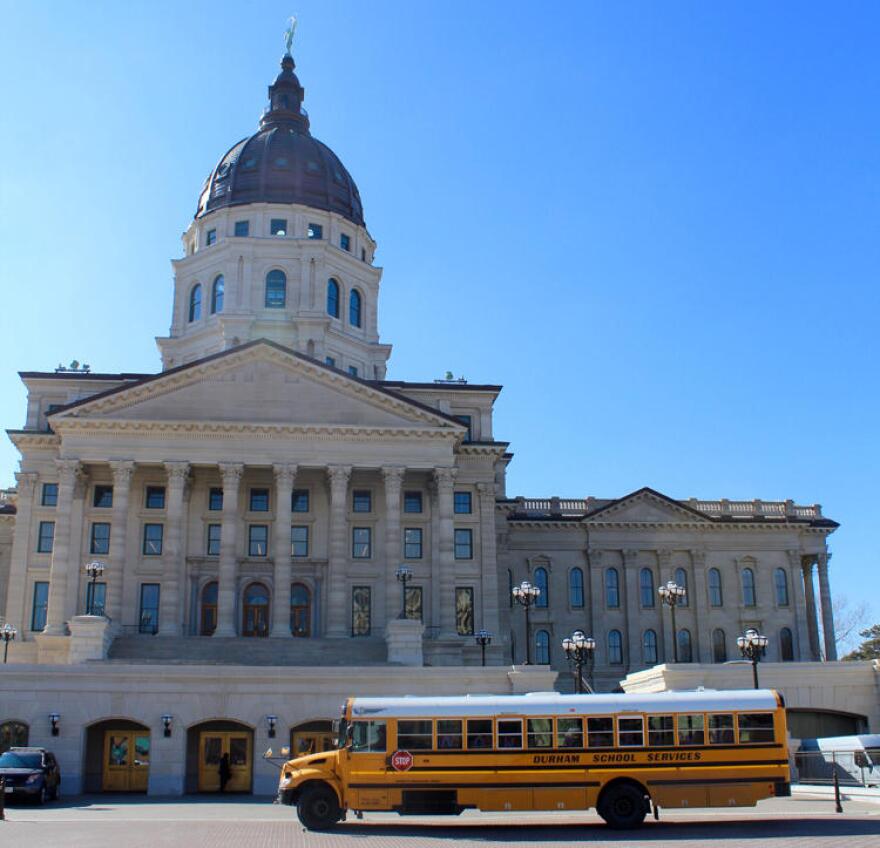A fresh legal challenge to the state’s 2014 elimination of teacher job protections has reached the Kansas Supreme Court, close on the heels of a separate lawsuit that proved unsuccessful six months ago.
At stake are due process rights for thousands — or even tens of thousands — of teachers who had earned them before the Republican-led Legislature passed and Gov. Sam Brownback signed the repeal.
In name, the case is a battle between the school board of a 270-student district in rural Butler County, east of Wichita, and two teachers dismissed from their jobs in 2015.
Read the Kansas National Education Association court brief on behalf of the plaintiffs.
At its heart, however, the case is a showdown between the state’s main teachers union and the state itself. The Kansas National Education Association is representing the plaintiffs, Sallie Scribner and Mark McNemee. Attorneys for Kansas have filed a brief intervening on the side of Flinthills Unified School District 492.
Read the state's brief intervening on the side of Flinthills Unified School District 492.
“We’re here really to protect the constitutional concept that the law matters and process matters,” KNEA general counsel David Schauner said Monday, “and the Legislature isn’t free to do whatever it wants, whenever it wants, without recourse.”
The KNEA argues that taking tenure away from teachers who had already earned it was equivalent to depriving citizens of their property without due process — a violation of the U.S. and Kansas constitutions.
The state rejects that characterization and says teachers never had a constitutionally protected right to keep their job protections. And even if a property right did exist, it argues, the Legislature’s vote to repeal tenure was sufficient to end it.
The repeal was “clearly constitutional,” the state’s brief argues.
“Plaintiffs may disagree with the policy the Legislature adopted,” it says, “but the law does not violate the Due Process Clause.”
The parties finished filing briefs in late June. The KNEA predicted this week that oral arguments, which haven’t yet been scheduled, will take place in September at the earliest.
Read the Flinthills USD 492 brief.
‘Non-probationary’ status
Scribner had worked at Flinthills for 18 years and McNemee for 16.
At the end of the 2014-15 school year, the Flinthills school board informed both in writing that their contracts wouldn’t be renewed, without stating reasons or allowing independent hearings.
Prior to July 1, 2014, the board would have been required to take those steps, but it argues Scribner and McNemee no longer had tenure in light of the 2014 repeal.
A third teacher, Monica Pharr, lost her job at Kansas City Kansas USD 500 in the same manner and sued in Wyandotte County, also with representation by the KNEA. The district court stopped that suit this month, pending the outcome of the Flinthills case at the high court.
The Flinthills case could restore due process for all teachers who had earned tenure before the repeal and haven’t switched employers since then. Under the law as it previously existed, teachers needed to complete three-year probationary periods at their districts before reaching what was formally called “non-probationary status.” This guaranteed them due process in case of termination or contract non-renewal.
The KNEA does not have a reliable count of how many of Kansas’ approximately 40,000 public school educators would regain tenure if the Kansas Supreme Court sides with the union. Schauner said more than 20,000 or 25,000 teachers “would not be at all surprising.”
The 2014 changes
The Legislature ended tenure in 2014 amid protests at the Statehouse by hundreds of red-clad teachers from across the state.
The Kansas Supreme Court had ordered lawmakers to increase funding for poorer school districts — part of a long-running and still ongoing school finance lawsuit.
The Legislature, controlled at the time by conservative Republicans, complied with a funding increase but included a tenure repeal. The process angered opponents because it involved late-in-the-night votes, and because the topic surfaced through an amendment on the Senate floor without hearings in either chamber.
The KNEA sued that summer, contending lawmakers had violated a Kansas Constitution clause that bars cramming unrelated matters into a single bill.
It lost at the district court and appealed. In January the Kansas Supreme Court ruled the 2014 legislation hadn’t run afoul of the restriction.
The claim in the new lawsuit — that the state unconstitutionally stripped tenured teachers of their property — bears similarities to an argument that another branch of the National Education Association made in North Carolina after that state ended tenure in 2013.
The idea that a property right had been violated resonated with North Carolina’s Court of Appeals. But the state’s Supreme Court ultimately struck down the retroactive tenure repeal without weighing in on the property argument. Instead, it found the law had violated contractual obligations.
Celia Llopis-Jepsen is a reporter for the Kansas News Service, a collaboration of KMUW, Kansas Public Radio and KCUR covering health, education and politics. You can reach her on Twitter @Celia_LJ.




